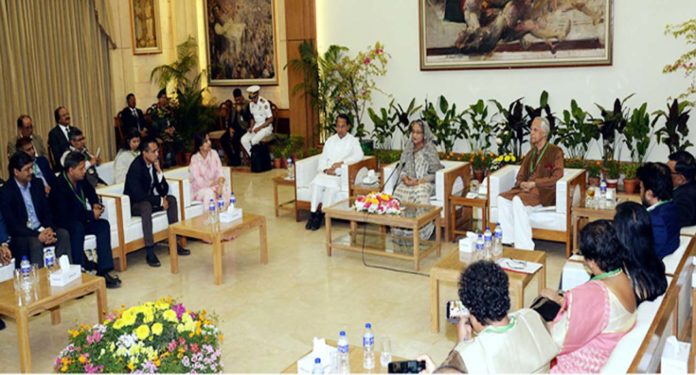DHAKA, Feb 20, 2018 (BSS) – Prime Minister Sheikh Hasina today sought mounting Indian pressures on Myanmar for repatriation of over a million of Rohingyas fearing their prolonged stay in Bangladesh could create militancy related security risks.
“We want India to mount pressure on Myanmar so they quickly take back their displaced people,” she told an Indian journalist group which paid a courtesy call on her at the premier’s official Ganabhaban residence this evening.
Sheikh Hasina said Rohingyas longer stay in Bangladesh could create a security crisis as “when people remain frustrated and have no work, they could easily be indulged in militancy”.
“Militancy now is a global phenomenon . . . we have given attention to the issue so that this kind of incident doesn’t happen,” she said.
The premier expected New Delhi’s sustained pressure would force Myanmar to take back their citizens adding that she also directed the foreign office to hold a dialogue particularly with five countries including India which have borders with Myanmar seeking their initiative for solving the Rohingya crisis.
Sheikh Hasina also pointed out the humanitarian side of the crisis that exposed minor Rohingya children, “who are growing in numbers everyday”, and their elderly people to aggravated miseries during the upcoming monsoon.
“The monsoon is nearing and keeping the Rohingyas in this way (in makeshift camps) is very risky for Bangladesh as well as for them,” she said.
Sheikh Hasina said Bangladesh signed an agreement with Myanmar while discussions were underway with NayPyiDaw, which, however, agreed for the repatriating their nationals.
The premier also sought India’s active role so the Rohingyas were not exposed to any fresh atrocities or torture on their return home in Myanmar’s Rakhaine state.
The Indian journalists from Kolkata and New Delhi are on a visit to Bangladesh to participate in a three-day Bangladesh-India media dialogue being staged by Institute of Conflict, Law and Development Studies (ICLDS), coinciding with the International Mother Language Day 2018.
Information minister Hasanul Haq Inu, state minister Tarana Halim and premier’s press secretary Ihsanul Karim were present during the interaction while ICDLC chairman and former ambassador Muhammad Zamir, vice chairman Prof Abdul Mannan, advisor Mozammel Babu and convenor Shyamal Dutta accompanied the visiting delegation.
The interaction also featured Bangladesh relations with China alongside India having issues of Teesta water sharing, connectivity and access of Bangladesh’s TV channels to India and Bangladesh’s next general election.
The premier said the current Dhaka-Beijing relations should not worry India as all countries are contributing to Bangladesh’s development.
“We want investment and cooperation from whoever offers it as we want development of the country . . . we have to think about our people as they are the beneficiaries of the development,” she said.
The premier pointed out that alongside India, China, Japan and even Middle Eastern countries were coming to Bangladesh for cooperation.
“India has nothing to be worried about it . . . “I will (rather) suggest India that it should have good relations with its neighbors, including Bangladesh, so this region could be developed further and we can show the world that we all work together,” she said.
Asked if she saw any challenge in Dhaka-Delhi ties, she answered in the negative saying “our ties are excellent” and any problem could be resolved bilaterally through discussions and “Bangladesh and India set an example of solving problems like maritime dispute and land boundary issues”.
“If there is any problem, we could solve it through discussions as we did it in the past . . . we want to build a peaceful South Asia,” Sheikh Hasina said.
She recalled that during the 1996-2001 tenure in government, Dhaka signed the Ganges water treaty while her second term witnessed the resolution of maritime dispute and the land boundary issue.
“(But) we have a lone (common) enemy — that is poverty and we should fight it together,” the premier said.
On the much-talked about Teesta water sharing issue with India, the premier said she is optimistic about signing of the Teesta water sharing agreement.
She hoped that all the agreements, including the Line of Credit, that were signed with India will be implemented.
“Our only sorrow is that Didi Moni (Mamata Banerjee) didn’t give us water …when we sought water, she offered electricity that we accepted,” she said with a smile.
In this regard, the premier said, there is such a system in India that its federal government could not do anything without the consent of the state. “I have talked to the chief minister who didn’t say ‘no’ on the issue…discussion is underway and we will wait for it,” she said.
Sheikh Hasina extended her greetings to Mamata Banerjee through the journalists, saying that “we want everybody remains well”. She said the government has also taken initiatives for dredging the country’s rivers to keep up their navigability.
About the next election, the Prime Minister said, there is multiparty system in the country and it is a decision of the parties who contest the polls or not. “The parties will have to take decision whether they take part in the polls or not…we’ve nothing to do anything,” she said.
She said there is no shortage of parties in the country. “BNP has 20-party alliance and we’ve also a 14-party combine. Besides, General Ershad has an alliance,” she said.
The premier said the BNP boycotted the last general election, which was its wrong decision. “I don’t know what the BNP will do in the future. They are suffering from hesitation, but I think majority of their leaders are in favour of joining the next polls,” she said.
Sheikh Hasina also said the country’s law and order is under control of the government.



